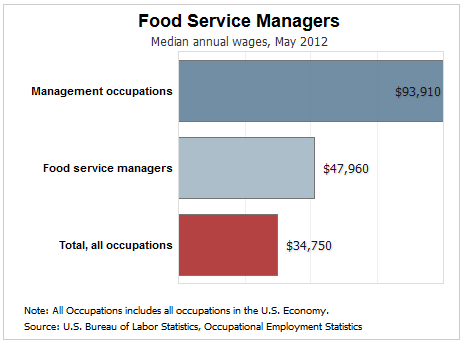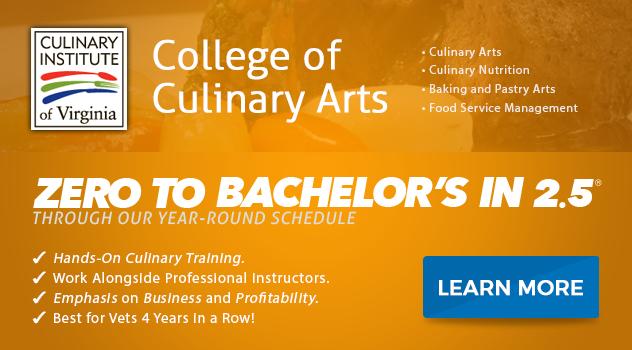
In order for a food service establishment to function efficiently and to operate at a profit, it must have effective leadership. Experienced, trained restaurant managers can provide that leadership.
They are responsible for overseeing the daily operations in all establishments that serve food and beverages. Their job calls for them to manage staff to safeguard diners' health while also ensuring that they are satisfied with their experience. Most restaurant managers work full time and those at fast food restaurants often spend a lot of time on the job. Those who work in institutional settings such as in schools or factories usually work traditional business hours.
Duties of a Restaurant Manager
The list of daily duties that a restaurant manager may be long and complex. In order to ensure that their establishment’s profitability, restaurant managers are called on to handle a range of tasks such as:
- The interviewing, hiring and training of employees. They may also be required to enforce disciplinary action including the firing of employees.
- The management of their restaurant's inventory. They may also be responsible for ordering food and other supplies as needed. Along with those duties, they may compose menus and price menu items to ensure their success.
- Making sure that their employees comply with health and food safety regulations.
- Scheduling staff hours and assigning duties. This includes ensuring that there is a sufficient number of workers to cover each shift.
- Handling and resolving customer complaints with regard to food or service.
- The oversight of financial records and transactions which may include the restaurant's budget and payroll.
- Stepping in and expediting or greeting guests when the restaurant is busy. Because food service is customer-oriented, a manager should be good at creating a friendly environment for both their patrons and their staff.
Ideal Qualities and Skills for Restaurant Managers
A restaurant manager should have a focus on and interest in different aspects of business such as budgeting and employee-
management.
- Social and customer service skills are important as managers may be called on to interact with guests. They should have an interest in ensuring that their patrons leave satisfied.
- Physical fitness and stamina are important due to the fact that a manager may spend an entire shift on their feet supervising their workers and helping with service.
- Communication skills are necessary as restaurant managers will need to speak to both their employees and their customers on a regular basis. They are expected to explain, instruct and direct effectively.
Training and Education for Restaurant Managers
In the past, many restaurant managers were able to qualify for their position with a high school diploma along with extensive experience in the food service industry. Typically, they worked as cooks or wait-staff. However, bachelor's degrees are increasingly desired for many managerial positions in food service. A food service management degree program could provide you with the managerial and hospitality skills needed for a successful career in food service management. You could acquire skills in areas such as financial and operations management as well as in leadership. Your courses may provide preparation in diverse areas like:
- Accounting
- Revenue management
- Business ethics
- The creation of customer service systems
Career Prospects for Restaurant Managers
The growth in the nation's population and average household income means that people may continue to stay home less and to dine out more, according to the Bureau of Labor Statistics (BLS). They are also expected to keep ordering meals to be delivered at their workplaces as well as take-out meals.
Individuals with job experience along with a bachelor's degree in food service management stand the best chance when competing for work in the food service industry.
What Could You Expect to Earn as a Restaurant Manager?
As of May 2012, food service managers had a median annual wage of $47,960 with the lowest 10 percent of earners making less than $30,820 according to the BLS. The highest-paid 10 percent earned over $81,000.
The experts in action!! @ Culinary Institute of Virginia - ECPI University School of Culinary Arts http://t.co/5WqCMcAhcu
— Pam Chambers (@pamipoofacials) February 25, 2014
How to Become a Restaurant Manager
If you want to get into the food service industry at the managerial level, you could get an edge with a Bachelor of Science degree in Food Service Management from ECPI University's College of Culinary Arts. You could graduate in a mere 2.5 years through our accelerated program, so contact us today to get a head start on your food service career. It could be the Best Decision You Ever Make!
DISCLAIMER – ECPI University makes no claim, warranty or guarantee as to actual employability or earning potential to current, past or future students or graduates of any educational program we offer. The ECPI University website is published for informational purposes only. Every effort is made to ensure the accuracy of information contained on the ECPI.edu domain; however, no warranty of accuracy is made. No contractual rights, either expressed or implied, are created by its content.
For more information about ECPI University or any of our programs click here: http://www.ecpi.edu/ or http://ow.ly/Ca1ya.



